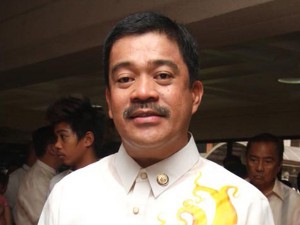Lawmaker wants OPAPP budget cut for ‘bungling’ peace process with MNLF
DAVAO CITY, Philippines – Bayan Muna Rep. Carlos Isagani Zarate has proposed that Congress trim down the 2014 budget of the Office of the Presidential Adviser on Peace Process (OPAPP) and suggested a review of how the Malacañang-attached agency performed in recent years.
Zarate told the Philippine Daily Inquirer that OPAPP “fail(ed) to address issues in the peace negotiations between the government of the Philippines and the Moro National Liberation Front (MNLF), which resulted in the standoff between the Armed Forces of the Philippines and the MNLF in Zamboanga City.”
Earlier, Zamboanga City Mayor Ma. Isabelle Climaco-Salazar also blamed the OPAPP for the crisis that had gripped her city since Sept. 9.
“Because of the incompetence of the OPAPP in reaching out to them (MNLF) and the two leaders with their ideologies…the people are suffering. We are all victims here. Despite numerous appeals to OPAPP to go to Sulu and address the problem of Nur Misuari, the OPAPP did not listen,” Climaco-Salazar said.
“OPAPP’s tough stand against the MNLF in the peace negotiation and its disregard of Professor Nur Misuari has resulted in the bungling of the peace talks (process) with the MNLF,” Zarate said. The MNLF signed a final peace agreement with the Philippine government during the presidency of Fidel Ramos in 1996 but the MNLF claimed that the Philippine government has failed to implement the terms of the peace pact.
Article continues after this advertisementOPAPP has asked Congress to approve its proposed P351.5 million budget, on top of the P7-billion fund for its project, the Payapa at Masaganang Pamayanan, a support project for the government’s peace and development program for former rebel groups such as the MNLF and the Rebolusyonaryong Partido ng Manggagawa ng Pilipinas/Revolutionary Proletarian Army/Alex Boncayao Brigade.
Article continues after this advertisementZarate said that President Aquino’s inclusive or comprehensive peace policy has been questioned after “OPAPP revealed that it was the President’s marching orders to terminate peace negotiations with other groups.”
He said this smacked of patronage politics and a counter-insurgency stance. Zarate suggested that the Pamana lump sum fund scattered in 10 agencies, including the Department of the Interior and Local Government (DILG), be scrapped as well.
“(This showed) OPAPP’s selective stand against other peace panels of the negotiations, terminating the MNLF peace talks and scuttling the National Democratic Front (NDF) peace negotiations while rushing and promising more funds to the Moro Islamic Liberation Front (MILF),” he said.
Misuari has accused the government of unilaterally terminating the tripartite review of the 1996 Final Peace Agreement when he recently made a declaration of independence.
“The peace policy of President Aquino should not be divisive and exclusive. It should not leave out a legitimate group just to appease another group. This is no way of talking peace in Mindanao,” Zarate said.
OPAPP chief Teresita Quinto-Deles earlier said the government has not dropped its commitment to the 1996 peace agreement and has been finding ways to address the issues that Misuari has raised.
In fact, Deles said a tripartite meeting with the MNLF and the Organization of Islamic Cooperation was to be held in Indonesia on Sept. 16 but it was the MNLF, which asked for postponement.
The MNLF is also a beneficiary of the Pamana program, according to Laisa Alamia, executive secretary of the Autonomous Region in Muslim Mindanao.
Alamia said development programs were rolled out in ARMM communities identified as beneficiaries of the Camp to Communities (C2C) project of the Pamana. Pamana covers peace and development, education, livelihood, and health projects.
She said for 2013 and 2014, the government allotted up to P2.6 billion for Pamana projects.
Ma. Cleofe Gettie Sandoval, OPAPP deputy chief, said she also wanted to correct the notion that the government’s peace efforts were only for particular groups.
Sandoval, in a statement, cited the recent launching of the P37-million Locotan farm-to-market road project under the PAMANA program in Kabankalan, Negros Occidental, which benefitted members of the Kapatiran sa Progresong Panlipunan, a group made up of former communist rebels.
